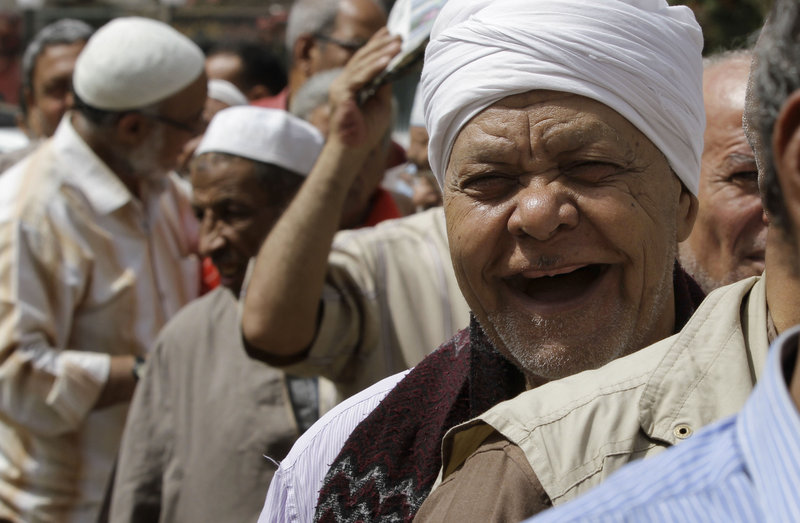CAIRO – After a lifetime of being told who will rule them, Egyptians dived enthusiastically into the uncertainty of the Arab world’s first competitive presidential election Wednesday. Up to the last minute, voters wrestled with a polarizing choice between secularists rooted in Hosni Mubarak’s old autocracy and Islamists hoping to enfuse the state with religion.
The choices in the race raised worries among many whether real democracy will emerge in Egypt. And the final result, likely to come only after a runoff next month, will only open a new chapter of political struggle.
But in the lines at the polls, voters were palpably excited at the chance to decide their country’s path in the vote, which is the fruit of last year’s stunning popular revolt that overthew Mubarak after 29 years in power. For the past 60 years, Egyptian presidents running unchallenged have largely been reaffirmed in yes-or-no referendums that few bothered to vote in.
Mohammed Salah, 26, emerged grinning from a poll station Wednesday, fresh from casting his ballot. “Before, they used to take care of that for me,” he said. “Today, I am choosing for myself.”
Medhat Ibrahim, 58, who suffers from cancer, had tears in his eyes. “I might die in a matter of months, so I came for my children, so they can live,” he said, waiting to vote in a poor Cairo district. “We want to live better, like human beings.”
Adding to the drama, there is no clear single front-runner. Four of the 13 candidates have bounced around the top spots in various polls.
None is likely to win outright in the balloting Wednesday and today, so the top two vote-getters will enter a runoff June 16-17, with the victor announced June 21.
The two secular front-runners are both veterans of Mubarak’s regime — former prime minister Ahmed Shafiq and former foreign minister Amr Moussa.
The main Islamist contenders are Mohammed Morsi of the powerful Muslim Brotherhood and Abdel-Moneim Abolfotoh, a moderate Islamist whose inclusive platform has won him the support of some liberals, leftists and minority Christians.
The debate went right up to the doorsteps of schools around the country where polls were set up.
Some voters backed Mubarak-era veterans, believing they can bring stability after months of rising crime, a crumbling economy and bloody riots. Others were horrified by the thought, believing the “feloul” — or “remnants” of the regime — will keep Egypt locked in dictatorship and thwart democracy.
Islamists, particularly the Muslim Brotherhood, saw their chance to lead a country where they were repressed for decades and to implement their version of Islamic law. Their critics recoiled, fearing theocracy.
Some saw an alternative to both in a leftist candidate, Hamdeen Sabahi, who has claimed the mantle of Egypt’s first president, the populist Gamal Abdel-Nasser.
An Islamist victory, particularly by Morsi, will likely mean a greater emphasis on religion in government. His Muslim Brotherhood, which already dominates parliament, says it won’t mimic Saudi Arabia and force women to wear veils or implement harsh punishments like amputations. But it says it does want to implement a more moderate version of Islamic law, which liberals fear will mean limitations on many rights.
Send questions/comments to the editors.



Success. Please wait for the page to reload. If the page does not reload within 5 seconds, please refresh the page.
Enter your email and password to access comments.
Hi, to comment on stories you must . This profile is in addition to your subscription and website login.
Already have a commenting profile? .
Invalid username/password.
Please check your email to confirm and complete your registration.
Only subscribers are eligible to post comments. Please subscribe or login first for digital access. Here’s why.
Use the form below to reset your password. When you've submitted your account email, we will send an email with a reset code.